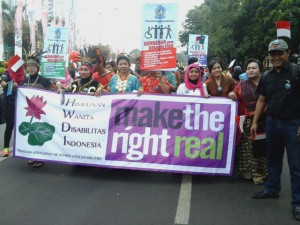 By: Nurjanah*
By: Nurjanah*
Law Number 4 Year 1997 on Disabled Persons is no longer relevant to be used. Not only in the sociological context, but also in juridical and philosophical context, this regulation should be revised adjusting the principals of Convention on the Rights of Persons with Disabilities.
To change the civil society stigma and their negative behavior towards persons with disabilities as well as to adjust the regulations with the necessity of the disabilities, since 2012, the advocacy process has begun to create the Draft Bill on Persons with Disabilities. The working group of Draft Bill on Persons with Disabilities and the National Commission on Human Rights worked hard to endorse this bill as one of National Legislation Program in 2014. But unfortunately, their effort could not be proceed because the parliament members’ tenure ended at the same year. Consequently, the legislation process had to be re-started. Due to the effort of the Draft Bill on Persons with Disabilities working group and the National Commission on Human Rights as well as other organizations, in 2015, this draft bill has become one of discussion priorities. Currently, this bill is still in the process of harmonization in the legislature.
As an organization focusing on public service sector, PATTIRO with other civil society organizations encourage the government to soon ratify the Bill on Persons with Disabilities to replace the previous Law Number 4 Year 1997 on Disabled Persons which is not relevant to be used anymore. PATTIRO network has also involved in promoting the establishment of regulations which are responsive to the disabilities. PATTIRO Surakarta conducted an advocacy for some times resulting in a Regional Regulation Number 2 Year 2008 on Equality for Persons with Disabilities. In 2010, PATTIRO also conducted a policy advocacy to encourage a non-discriminative administrative service in Malang.
Various basic problems regarding the equality and equity for Persons with Disabilities are still found not only in social environment but also in family environment. Policies and regulations created by the government are yet to uphold those two important things. Government lack of understanding regarding the rights of persons with disabilities affects their comfortable, peace, and safe livelihood. As the government does not consider this as a priority issue, many proposals for difable capacity building and the development of difable friendly infrastructure are not accommodated in the government expenditure.
It is not easy to change society’s and government’s negative perspectives towards the difables. Center for Law and Policy Studies (PSHK) Indonesia in their book entitleMenuju Indonesia Ramah Disabilitas (2015) explains that:
“All this time, the government uses the conservative approach, the charity based approach. By using this approach, the government and society see the difables as a group of persons who are unlucky and not able to compete with other people. This perspective emerges because of the existing policies are still focuses only on their physical condition. Meanwhile in fact, the difables are still part of the citizen of this country whose rights also have to be fulfilled by the government.” (p. 117)
Aside from the negative perspective problems, there is another thing considered less important but has a great impact that is the unavailability of difables disaggregated data in most of areas in Indonesia. Until this very moment, the government still does not have the accurate disaggregated data. This affects the fulfillment of the rights of the persons with disabilities such as rights to education, health, and the most fundamental rights, rights to communicate and interact naturally with their social environment.
PATTIRO considers the disaggregated data collection as an important thing to do. Therefore, Program Peduli for Women with Disabilities team program in West Lombok District and Sorong District focuses on that matter. The data collection is done by conducting an initial assessment which is later continued with the implementation of a baseline survey. To conduct the data collection optimally and comprehensively, PATTIRO will collaborate with West Lombok and Sorong Social Department to develop an SMS Gateway based application. PATTIRO hopes that this application will be able to solve the existing problems.
*The writer is the Program Officer of Program Peduli for Women with Disabilities




